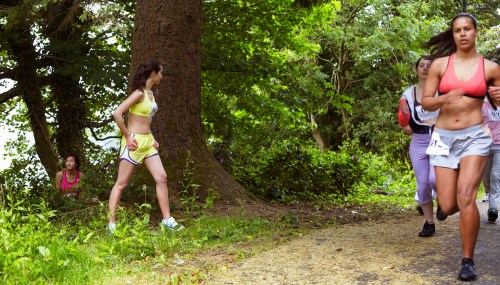5 Strategies To Keep ‘The Runs’ From Ruining Your Run, According to a Sports Dietitian and Run Coach
For marathon runners, pooping can be a major hurdle—and embarrassment. Learn how to keep the runs from ruining your run (of any length).

You’ve had your morning brew, laced up your shoes, and are readying to conquer your day by starting it off with a run. But within just a few minutes of hitting the pavement, you start to feel some rumblings in your bowels that quickly grow into an urgent need to go number two right now. Cue: a frantic search for any nearby bathroom.
Experts in This Article
registered dietitian and run coach for New York Road Runners
registered dietitian, certified specialist in sports dietetics, and owner of Hill Health Nutrition
If this is a problem you’ve faced, you’re certainly not alone. “I hear this a lot, and I’ve been there myself as well,” says New York Road Runners running coach and registered dietitian Alba Pllana, RDN.
Running can give us a case of “the runs” because of how physical activity affects our blood flow. “When you’re exercising—and especially high-intensity exercise—there’s an increased blood flow that’s diverted away from your digestive system, and it’s directed towards the muscles being used,” says Jordan Hill, RDN, a registered dietitian at Top Nutrition Coaching and certified specialist in sports dietetics. “The muscles you’re using as you’re running are getting more blood flow than your gut is—and that reduced blood flow to the gut can lead to changes in bowel activity.”
You know when you’re in a crowded place and you’re trying to make space for yourself or push your way out? A similar thing happens to your insides when you run, specifically. “‘Jostling’ of organs is something that occurs when running and can impact the gut,” Hill adds. This happens because of the bouncing motion of your whole body, which pushes certain things down the digestive tract.
That doesn’t mean all your runs are doomed to be interrupted by an urgent need to poop. There are a few strategies you can use that can prevent this from happening.
How to avoid ‘the runs’ on your run
1. Time your pre-run meals strategically
I have to admit that I’ve gone on runs immediately after eating. I also have to admit that those runs aren’t my best. I feel full, sluggish, and slow. Turns out I inadvertently picked a losing strategy. In fact, says Pllana, whether you’re going on a short run or a long run, you shouldn’t eat 30 minutes to one hour before you run.
“You want to allow enough time to digest before you exercise,” says Hill. Really, you shouldn’t have any big meals within three hours of starting your run. And, if you’re going to have a pre-run snack, “it should be light and easily digestible,” says Hill. (Think: a banana or Pop-Tart.)
Everyone’s gut reacts differently to the amount of food that’s in their body before a run—eating more won’t necessarily trigger the need to poop, but it could. “The rate of digestion and the absorption of the food [are what impacts] when the person’s next bowel movement will be,” says Hill. The timing also depends on our hydration status, stress levels, and any medications we’re taking. Pay attention to your own body’s typical timing, and err on the side of caution by giving yourself ample opportunity to digest before lacing up.
2. Avoid fat and fiber and sweeteners
“As good as fat and fiber are for you, they’re not great to eat before runs,” says Pllana. “They’re harder to break down and cause a lot of gas—and who wants to pass gas while they’re running?” That means saving foods high in fiber like broccoli, kale, brussel sprouts, and legumes, as well as all those good fats like avocado and olive oil until your post-run meal.
Gold Medal Couple Tara Davis-Woodhall and Hunter Woodhall Talk Marriage, Motivation, and Their Next Chapter With Nike

Coach Kara Lawson Wants You to ‘Handle Hard Better’—and Here Are 3 Ways to Do Just That

JuJu Watkins Leaves March Madness With ACL Tear—and This Knee Injury Is More Common Than You Think

According to Hill, eating large amounts of fats and fibers before running can cause you to poop, or simply be painful or uncomfortable due to the gas they cause. Instead, she says, “The rule of thumb is high carbohydrate, moderate protein, and low fat [and fiber] to avoid that gastrointestinal distress.”
Also steer clear of artificial sweeteners. “Some sweeteners, which are called sugar alcohols, are often found in sugar-free candies, gum, and ice cream,” says Pllana. These tend to irritate your gut, she says, so are best avoided pre-run.
3. Take note of your poop schedule
I’ve never tried to make myself poop, but I can’t imagine it would go well. In fact, experts say it’s unideal to try to make yourself poop before a run. What you should do, apparently, is just track your bowel movements and plan your runs around that.
“A lot of us can’t poop on command, so it’s key to know what your regular cycle is,” Hill says. “If you can time your runs so that you know you’re going to be empty, that can be beneficial. For example, if you know you poop in the morning, go on your run after that.” For many of us, coffee is a trigger, so aim to finish your cup with enough time to do your business before heading out the door.
4. Pick a route with a bathroom
Particularly if you have IBS or other GI issues, or simply know you’ll always need to go on your morning run, follow a route with toilets available. Maybe that’s a park with public restrooms, or maybe you stay near shops or hotels that will let you use their facilities. You can even begin your run with a short loop around your home if that first mile always gets things moving for you.
“If you know you’re someone who has GI upset or has to use the bathroom after a certain distance or mile, definitely plan in a bathroom along the way,” says Hill. “If you’re a newer runner, you probably haven’t figured out or noticed how running impacts your digestive system, so make sure there’s a bathroom nearby.”
5. Manage your stress and anxiety
If you’ve run even a quarter of a mile before, you’re well aware that running isn’t always fun and games. Sometimes, it’s downright difficult. Yet Pllana and Hill agree that showing some mental fortitude—and self-awareness—can work wonders for your gut.
Pllana’s advice? “Stay relaxed,” she says. “When you tense up, you get stressed and anxious, and this can contribute to GI issues.” Whether you’re practicing deep breathing, meditation, or listening to music, the important thing here is to stay chill. “Sometimes, you can do all the right things, but getting nervous and anxious will trigger your gut,” Pllana says. (This is one reason we often have to go before a race.)
To take it back to the early 2000s, the best thing you can do on a run is “keep calm and carry on.”
Sign Up for Our Daily Newsletter
Get all the latest in wellness, trends, food, fitness, beauty, and more delivered right to your inbox.
Got it, you've been added to our email list.







